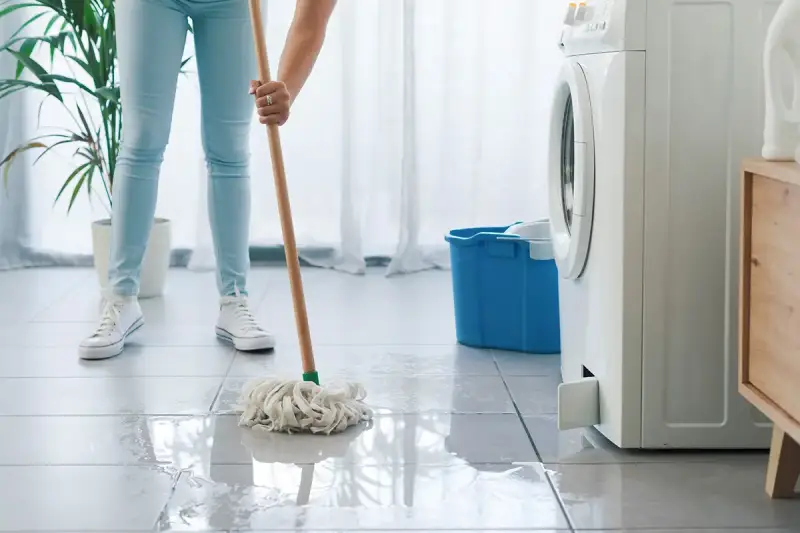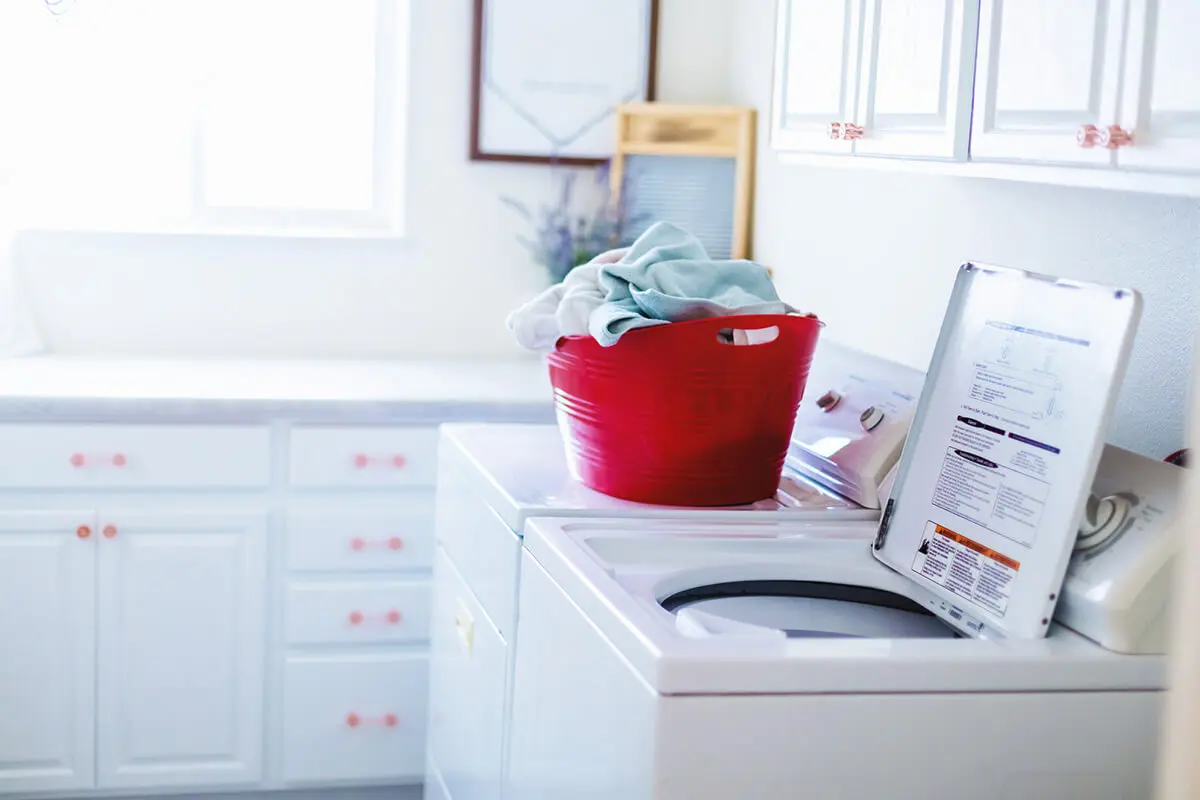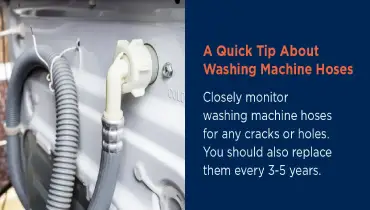How To Fix a Leaking Washing Machine

Are you concerned about the puddle of water you just found on the laundry room floor? Don’t panic.
A leaking washing machine can be caused by any number of things, like overloading the washer, damage to the fill hose, and using the wrong or too much detergent. Many times, a simple DIY fix is all that’s required. In other cases, repairs are best left to the professionals.
To help you identify and resolve a washing machine leaking water problem, our experts will break down common causes for washing machine leaks, how to fix them, and how to tell when it's time to call in a service professional.
How To Locate the Washing Machine Leak
In some instances, what appears to be a washing machine leaking may just be a spill. It’s important to figure out if the washer is actually leaking and then determine where the water is coming from before you start trying to repair it.
To test if the washer is actually leaking:
- First, make sure the water you find isn’t just from a spill or clogged drain.
- Next, test if the washer is leaking by wiping up the water, drying the area, and running a normal wash cycle.
- Then, check under and behind the appliance for water.
- If another puddle has formed, it’s time to answer the question, “Why is my washing machine leaking?”
Before you initiate any repairs, make sure your washer is unplugged, and the water to the washer is turned off to avoid any accidents or further messes. Here are the most common culprits of a leaky washing machine and how to fix them.
Top-Load Washer Leaks
Because top-load and front-load washing machines operate differently, the causes of leaks can vary. Top-load washer leaks are often caused by issues with overloading or improperly connected hoses. Where the water is puddling is a good indication of the potential cause.

Leak at the Front of the Washer
Leaks at the front of a top-loading washing machine can have several causes, but they're generally an easy fix. Here are some of the most common causes and their solutions:
-
Overflow tube is clogged: This is one of the most common causes of a leaking washing machine. It's typically due to a buildup of detergent remnants, like if you use too much or the wrong type of product.
How To Fix It: To see if you’re using too much detergent, place a freshly washed item in a bowl of water. If the water becomes soapy, reduce the amount of detergent you use. High-efficiency (HE) washing machines can use special HE detergents, which require less detergent per wash.
-
Overloaded washer: Washing machines that are too full can leak. Never fill your washing machine above the recommended line.
How To Fix It: Consider doing laundry more frequently or in smaller batches to avoid overfilling.
-
Unlevel washer: A washing machine that is unlevel will be off balance and prone to leaking.
How To Fix It: To level a washing machine, simply adjust the feet. To do so safely, ensure your machine is unplugged and that you use at least two people to safely lift it so you can adjust the feet at the base of the washer.
Leak at the Back of the Washer
Leaks at the back of the washer can have a few different causes, which can be more challenging to pinpoint. Some of their causes have quick fixes, while others may require a bit of technical know-how or a service professional’s help.
Here are some of the most common causes of leaks at the back of a top-load washer:
-
Hose isn’t connected to the drain pipe: If the drain hose is not properly secured to the drain pipe, it can cause a leak at the back of the washer.
How To Fix It: Check the connection at the back of the machine. If it appears loose, all you need to do is ensure the drain hose is fully inserted into the drain pipe.
-
Drain pipe is clogged: If the connection between the drain hose and pipe appears fine, but there’s still a leak, it’s likely due to a clog. As mentioned earlier, clogs are generally caused by lint buildup.
How To Fix It: There are several ways you can fix it, all of which are similar to how you might fix a clogged sink. You can use a drain cleaner, or try to snake the drain pipe. A serious clog may require the help of a service professional, who can use a power auger or other tools to unclog the drain.
-
Fill hoses aren’t properly secured: If the washer leaks from the back, it can also be caused by the fill hoses. Rubber hoses become cracked and brittle over time and will leak and need to be replaced.
How To Fix It: Replaced the hoses when needed.
-
Rubber washers are in poor condition: The rubber washers may have deteriorated over time, causing a leak.
How To Fix It: Remove the hose and remove the old washers. Replace them with new rubber washers and secure them properly.

Leak Under the Washer
A leak under a top-load washer is most commonly caused by a water pump leak. Leaks under the washer can be more challenging to fix yourself, as they are more difficult to reach and assess and require more serious technical skills.
Here are some common causes of leaks under a top-loading washing machine:
-
A water pump leak: The water pump circulates water in the machine. When it malfunctions, it may cause water to leak back out through the bottom of your washing machine.
How To Fix It: Replace the water pump immediately if you see it leaking. Those who are handy may be able to replace the water pump yourself. If not, a Mr. Appliance® service professional is just a phone call away.
-
The tub may have a defect: The tub of the washing machine consists of two parts: the part you see with drain holes in it and an outer tub. If there’s a defect or crack in the outer tub, it will cause a leak.
How To Fix It: Call a professional to replace the tub.
-
The water level switch is malfunctioning: The water level switch or sensor ensures that the machine fills with water to the correct level. If it stops working properly, the washing machine will overfill.
How To Fix It: Replacing this part requires the right tools and expertise, so call your local Mr Appliance for repair service.
Front-Load Washer Leaks
Front-load washer leaks are most typically caused by door sealing issues. As with top-load washers, where the water is pooling should give you an idea of where the water is coming from and what the issue is.
Leak at the Front of the Washer
One of the most common causes of leaks in a front-load washer is an issue with the door seal or gasket. Front-load washers need a watertight seal while the wash is running, so any issues with the seal will cause the machine to leak. Here are some of the common causes and fixes:
-
The door gasket isn’t sealing properly: The gasket provides a watertight seal while the washer is running, and things like deterioration or detergent buildup can cause it to leak.
How To Fix It: There are several ways to repair a gasket leak. The most important thing is to keep the gasket clean. Clean regularly to avoid product buildup or mold. Switch detergents and use less to avoid product buildup. Opt for dryer sheets or wool dryer balls rather than liquid fabric softener. You can also replace the gasket if the above doesn’t help. Since this requires special tools and knowledge, call your local Mr Appliance to have them replace the door gasket for you.
-
The door is misaligned: The door itself can also be the cause of a washing machine leaking. If the door is misaligned or not latching properly, this can cause water to leak out.
How To Fix It: Loosening the hinges and retightening them will usually resolve the problem. If not, contact your local Mr Appliance.
Leak at the Back of the Washer
The causes of a back-of-washer leak for top- and front-load washers are generally the same. These include issues such as:
- A clogged drain pipe
- A poor connection of the pipe or hoses
- Improperly installed, worn out, or missing rubber washers
- Damage to the fill hoses
Another possible cause for front-load washers leaking is detergent buildup and excessive suds causing a leak from the overflow tube at the back of the washer.
How To Fix It: Using a smaller amount of detergent and switching to HE detergent if you have an HE washer should help.
Leak Under the Washer
Similarly, the causes for a leak under the washer are the same between top- and front-load washers. Issues with the water pump are the most common, and problems with detergent and excessive suds can also cause leaks under front-load washers.
As with top-load washers, the fix for front-load washing machines could be to replace the water pump. Before you consider getting a new machine, contact your local Mr. Appliance and have one of their service professionals take a look. Often, a repair is cheaper and easier than shopping for and replacing your current machine.
Schedule Washing Machine Repair
Knowing why water is leaking from your washing machine doesn’t necessarily mean you’ll be able to — or want to — repair it yourself. And you don’t have too. Your local Mr. Appliance professionals have the expertise and experience to identify the problem and resolve it as quickly as possible.
Our team of service professionals is committed to delivering exceptional results so you resume your household routine and minimize the inconvenience associated with a broken appliance.
Washing machine leaking? Schedule appliance repair services today!
FAQ About a Washing Machine Leaking Water
If your washing machine is leaking water and you’re unsure of what to do next, you’re not alone. Here are some commonly asked questions about a leaking washer.
Is It Worth Fixing a Leaking Washing Machine?
Yes, it is worth fixing a leaking washing machine. Most washing machines can be fixed by making some simple adjustments or repairs or by having the machine assessed by a service professional.
Why Has My Washing Machine Flooded My Floor?
There are many reasons why a washing machine may have flooded the floor. Determining where the water is coming from is the first step in narrowing down potential causes, including using too much detergent, a clog in the tubing, an unbalanced machine, or an improperly sealed gasket.
Can a Washer Leak If Overloaded?
Yes, an overloaded washing machine can leak. This is a common cause of a washing machine leaking, and it's why you should avoid overfilling the machine.
This article is intended for general guidance only and may not be applicable to every situation. You are responsible for determining the proper course of action for your property and your situation. Mr. Appliance is not responsible for any damages that occur as a result of any advice or guidance derived from blog content. For the most accurate guidance, contact an independently owned and operated Mr. Appliance business for a professional custom and on-site assessment.
 Click to call
Click to call



